The Adriatic and Ionian Fora of Chambers of Commerce, Universities and Cities and their members, in cooperation with Adriatic and Ionian Initiative – Chairmanship of the Republic of Slovenia organized three online Round Tables as Side-Events within the framework of the 6th EUSAIR Forum.
The webinars analyzed and discussed three main topics: Climate Change, Blue Economy and Circular Economy. The Webinar “Small ports in the Blue Economy strategy”, which was held on May 10, was organized in collaboration with The Chamber of Commerce of Chieti Pescara and the Municipality of Vasto.
With the participation of several international guests, we tried to deepen the role of these ports from the commercial and tourist point of view in a shared development of the Blue Economy: a new type of “economy of the sea”, with above all a focus on environmental sustainability and the future of our sea.
To moderate the debate Fabio Travaglini – Vice President of ASPO (Special Agency for the ports of Ortona and Vasto).
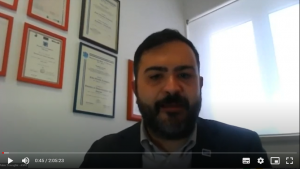
The meeting opened with greetings and introduction of Gennaro Strever, president of the Chieti and Pescara Chamber of Commerce from which the initiative for this conference started. After greeting all the participants in the event, the president reiterated how this round table had been set up to provide a contribution on a topic of common interest among the priority areas regarding the intervention strategy of the Adriatic-Ionian macro region. Hence, therefore, the theme of sustainable development of small ports by comparing the realities present in Italy with those of other Adriatic-Ionian cities through the intervention of the distinguished speakers involved.
The president continued his introduction by bringing to the attention of the guests the project that the Chamber of Commerce of Chieti Pescara is carrying out with the Abruzzo Region, to achieve a wide level of transport intermodality:
“[…] A new branch of the Mediterranean corridor that crosses Italy according to the Barcelona-Civitavecchia-Ortona-Ploce route, would entail a load of advantages for our productive realities, favouring the possibility of intercepting new flows of goods which, instead of traveling by road, would enjoy of an intermodal road-sea transport, with an undoubted improvement for the environment. […]”.
President Strever therefore concludes with a wish and a request for collaboration from the entire Adriatic-Ionian community, to achieve important results together for the citizens of tomorrow, while respecting the environment and the cultural heritage of each country.
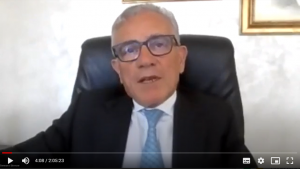
The introduction then continued with the brief speech by the mayor of Vasto Francesco Menna highlighting how Vasto, as a port of regional importance from a commercial and tourist point of view, with the help of the right funding and developments in the field of sustainability can be attractive and competitive along the Adriatic ridge.
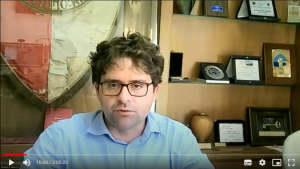
The following speech was given by Ambassador Milan Jazbec, Senior Official of the A-I initiative and of the Slovenian Ministry of Foreign Affairs, who first congratulated on behalf of the Slovenian Presidency for the organization of the event and thanked all the online participants.
The ambassador recalled how the issue of small ports it is strongly connected with tourism as a driving force of the economy highly important for the local communities. Moreover, how the synergy between different areas of society (civil, national and academic) present within this event, offers the possibility of fully analysing the case and therefore wide possibilities of discussion and solution for the community.
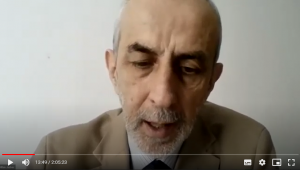
Representing international bodies, the introduction continues with the intervention of Ambassador Fabio Pigliapoco, part of the Permanent Secretariat of the AI initiative, who recalls how the intergovernmental association which he leads, has continued in its series of successes for 20 years now also thanks to the contribution of civil society, remarking:
“[…] without civil society, without subsidiarity, without the famous “bottom-up” principle, we would not have a (Adriatic-Ionian macro regional) strategy.”
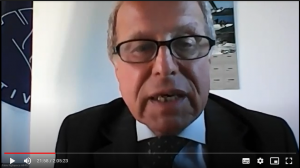
We then move on to greetings from the president of the AIC Forum Gino Sabatini, who begins his speech by warmly greeting all the participants of the event with the hope of being able to meet them personally when the pandemic condition will be more promising. He continues his speech, highlighting how the blue economy has been within the priorities of the European Union for several years now, recognizing the potential to make a significant contribution to economic recovery in an ecological sense.
Recalling all the sectors affected following the COVID pandemic and therefore the various regressions suffered by them, reaffirms the importance as FORUM AIC and as part of the Adriatic-Ionian strategy, the importance of being part of the “new restart” for all affected communities.
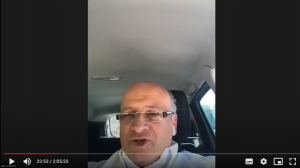
The word then passes to the President of the Chamber of Commerce of Crotone Alfio Pugliese, as the city has a reality such as Vasto with a similar port facility, both in the tourism and in industrial sectors. The president stressed the importance of ports for a territorial development process and reconversion of the urban aspect of cities. He then brought his own case study where, in collaboration with colleagues from the province of Cosenza, they are working as coordinators with respect to the various needs of port, territorial and civil authorities.
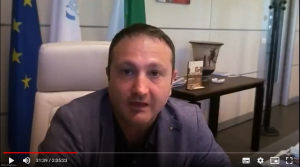
Last but not least, Mario Miccoli president of ASPO took the floor to introduce and start officially the round table. After wishing the speakers a good work and thanking the participants and organizers of the meeting, he recalled the commitment shown in the past years by the ASPO in understanding the fundamental theme of where small ports are located with respect to a growth in ports as a whole.
“[…] it will finally bring this territory to give the importance it deserves to the development opportunity of our port facility. […]”
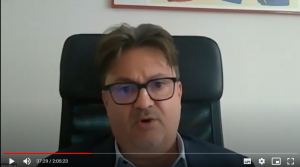
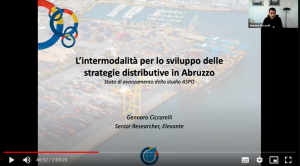 The first speaker was Gennaro Ciccarelli (senior researcher at ELEVANTE) who conducted a study on intermodal development in the port of Vasto on behalf of the Chieti-Pescara Chamber of Commerce. After a brief presentation of his consulting firm, he went on to provide the objectives and methodology they are following for their study and a state-of-the-art of what they have done so far. Following a careful review of the historical traffic data that closely affect the port of Vasto, Ciccarelli and his colleagues created a project plan to develop the potential of the port, reaching the conclusion of the importance of intermodality.
The first speaker was Gennaro Ciccarelli (senior researcher at ELEVANTE) who conducted a study on intermodal development in the port of Vasto on behalf of the Chieti-Pescara Chamber of Commerce. After a brief presentation of his consulting firm, he went on to provide the objectives and methodology they are following for their study and a state-of-the-art of what they have done so far. Following a careful review of the historical traffic data that closely affect the port of Vasto, Ciccarelli and his colleagues created a project plan to develop the potential of the port, reaching the conclusion of the importance of intermodality.
“ […] Basically as a solution we think that intermodal transport can not only guarantee that these traffics can be dealt with in the most effective and efficient way possible, but above all that intermodality is an element that allows you to gain competitiveness, capturing the socio-economic value in the area to the maximum. […]”
They therefore move to define the evolutionary scenarios of the project, and then identify the infrastructural and logistical needs to cope with increases in demand that will lead to greater attractiveness of the port. Of particular importance is their intention to cooperate closely with port operators in order to understand better what the catchment area is and of what type.
 The round table continued with the intervention of Eng. Gaetana Claudia Rubino took stock of the current situation regarding the port of Crotone, after a careful and interesting presentation of its ancient history and phases of development and decline. After having exposed the critical issues to which the port is subjected, however, she highlighted the possibility of development and growth thanks to the various tourist attractions that Crotone possesses.
The round table continued with the intervention of Eng. Gaetana Claudia Rubino took stock of the current situation regarding the port of Crotone, after a careful and interesting presentation of its ancient history and phases of development and decline. After having exposed the critical issues to which the port is subjected, however, she highlighted the possibility of development and growth thanks to the various tourist attractions that Crotone possesses.
The Chamber of Commerce has therefore developed together with the port authorities, institutions and citizens a master plan to “transform the port from a non-place to an inter-place: a new link between the urban and the port areas, in order to connect the city to the “Water Front” and its set of environmental and cultural values “. Finally, she concludes that the Crotone experience can be identified as “best practice” and therefore re-proposed and extended to other port realities as well.
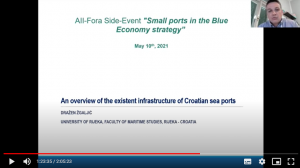 We then had the opportunity to listen to the first international speaker, assistant Professor Dražen Žgaljić who, thanks to his work for the Department of Maritime Studies at the University of Rijeka, spoke to us about the limits and possibilities of development of small ports and marinas in Croatia. After providing the technical data regarding the situation on the other side of the Adriatic, he brought to light the lack of a standard of services present within the Croatian port.
We then had the opportunity to listen to the first international speaker, assistant Professor Dražen Žgaljić who, thanks to his work for the Department of Maritime Studies at the University of Rijeka, spoke to us about the limits and possibilities of development of small ports and marinas in Croatia. After providing the technical data regarding the situation on the other side of the Adriatic, he brought to light the lack of a standard of services present within the Croatian port.
Underlining how the port is the “first glance” of the city for the tourist, he then recalled how the port is, therefore, an important showcase for the cities and therefore needs the right measures and financing. For this reason, he proposed a coordination between entities to create a mandatory list of essential services that must be accessible in every port and to which all ports on the Adriatic should comply.
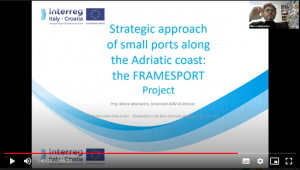 In this regard, the next interlocutor is connected: Professor Marco Mazzarino of the IUAV of Venice who is within the coordination of the FRAMESPORT project, a project funded by Italy-Croatia INTERREG precisely on a strategic approach to small ports along the Adriatic coast.
In this regard, the next interlocutor is connected: Professor Marco Mazzarino of the IUAV of Venice who is within the coordination of the FRAMESPORT project, a project funded by Italy-Croatia INTERREG precisely on a strategic approach to small ports along the Adriatic coast.
The professor begins his presentation by noting how much the nautical sector is overshadowed despite representing a great opportunity on a national level, regarding the enhancement of the territory and resources in terms of environmental sustainability. The most important fact that has been observed is certainly the fragmentation of the supply of services or information by the ports and therefore a lack of real strategic coordination initiatives.
He explained how essentially what is lacking -in technical terms- is information relating to the quality of the service: a lack of tools that can support prudent and conscious investment choices by economic operators.
“[…] with an overall look, above all on our national side, we note a lack of competitiveness in this sector and therefore a loss of opportunities for economic growth and enhancement of the territory from an environmental point of view. […]”
What the project deals with is therefore to create a decision support system for users, operators and policy makers for the creation of an “Adriatic Cluster” for sustainable nautical tourism.
Finally, we come to the last intervention, by the director of the Port Authority of Rovinj, being a small port that has developed a lot in recent years, especially in terms of tourism.
 Dott. Donald Schiozzi, after reconnecting to the projects and data presented by prof. Žgaljić and Mazzarino in their respective presentations, talked about how Rovinj has already pushed to raise the standards of services present in their port and wants to push further:
Dott. Donald Schiozzi, after reconnecting to the projects and data presented by prof. Žgaljić and Mazzarino in their respective presentations, talked about how Rovinj has already pushed to raise the standards of services present in their port and wants to push further:
“[…] we certainly want to enhance our “Water Front” through our port master plan so that it is multitasking: that is not only useful for recreational boating or cruising but -as the colleagues from Crotone did- a revaluation by giving much more services not only to users of the sea but also to citizens also from an environmental point of view. […]”
He concludes by declaring full agreement with the previous interventions concerning the need for full international collaboration in favor of an improvement in the quality and standardization of port services in the Adriatic.
To conclude this important conference, the president of ASPO Miccoli takes the floor again. He thanks all those who attended the round table and reiterates how only through the creation of common strategies small ports will assume in the future a strategic role for the development of both tourism and trade, in the respective territories and in the Adriatic Ionian macro-region.
The debate will continue in the group created within the Stakeholder Platform, in which the presentations of the speakers and the recording of the event will be uploaded.
Here the Presentations of the Speakers:

